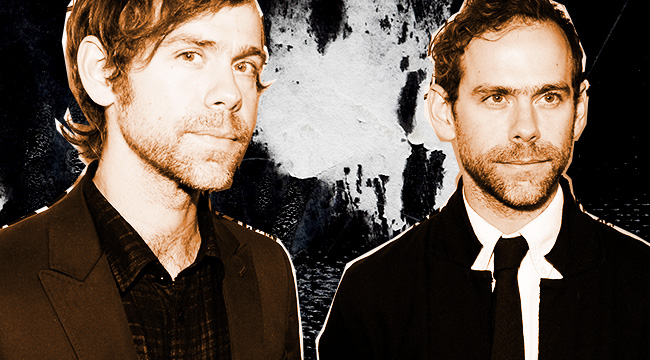
Earlier this month, Aaron and Bryce Dessner of The National, along with their friend and frequent collaborator Justin Vernon of Bon Iver, announced an ambitious new project that in some ways is still in the process of being defined. Dubbed PEOPLE, it’s described by the founders as a publishing platform for music that might not otherwise have a clear pathway to a commercial release: improvisational jams, meandering avant-garde instrumentals, in-progress brainstorms that might eventually end up on a National or Bon Iver record, and whatever else the musicians and their growing circle of colleagues dream up.
Looked at more broadly, Vernon and the Dessners hope PEOPLE can be a catalyst for collaborations between artists, both famous and obscure, that are spontaneous and freewheeling and devoid of the expectations and limitations inherent to music released under the guise of a record label or some other corporate entity. The artists have already pursued these utopian artist ideals at their artist-curated festivals, like Eaux Claires, MusicNow, and this summer’s PEOPLE festival in Berlin, coming up Aug. 18-19, in which musicians from the indie mainstream (including Feist, Jonsi and Alex Somers from Sigur Ros, and Beirut’s Zach Condon) and experimental fringes come together to exchange ideas. On PEOPLE, a musical fragment started by one artist might be developed by another artist, and then progress from there as listeners tune in.
On the PEOPLE platform, there’s a smattering of buzz-y indie releases, including four tracks from Big Red Machine, a new side project from Vernon and Aaron Dessner that will be rolled out in installments in the coming weeks. But much of the music found on the site — currently in its beta phase, though one hopes the finished product retains PEOPLE’s current unpolished Web 1.0 look — will be utterly unfamiliar to most listeners, which is kind of the point. If you want to hear old favorites by The National or Bon Iver, you won’t find them here. PEOPLE is strictly an avenue for music that probably couldn’t live anywhere else. While most streaming services specialize in providing listeners with exactly the music they know they already like, as well as new music that sounds similar to the stuff they already know, the hope with PEOPLE is that adventurous listeners will embrace the thrill of the hunt and the potential for new discoveries.
As to whether fans will embrace this platform, and whether the musicians involved will use it to facilitate truly worthwhile and lasting music … even the artists themselves aren’t totally sure yet. When I chatted with Aaron and Bryce last week, they didn’t claim to have any grand designs on what the future of PEOPLE will be. For now, the possibilities are endless — which is always the most exciting place to be.
You’ve talked a bit already about the platform from an artist’s point of view. I was wondering if you would address the audience’s perspective. What do you hope that listeners get out of PEOPLE?
Bryce Dessner: It’s sort of the anti-algorithm, in that there is no algorithm. The way that most of the Internet is, it’s you like this thing, so you’re also going to like that thing. I find that that’s rarely the case, for me anyway. And it removes a lot of the beauty of the early days of the Internet. It was sort of like the wild west — you would get lost and find your way. Right now it feels like the path was made for you. I hope that the feeling [of PEOPLE] will be a little more like going to an old record store, or tuning to a radio station where you just like what they put on.
Aaron Dessner: I use Spotify as a convenience. But there’s nothing about the user experience that excites me.
The most interesting aspect of PEOPLE to me is that you’ll be sharing music that in some cases is still in the process of being worked on, rough drafts of songs that you’ve already released, and improvised pieces from jam sessions at your festivals. It reminds me in a way of the Grateful Dead and other jam bands — they trained their audience to appreciate listening to the process of creating music in the moment, as opposed to only caring about a polished final product. But is that a steep learning curve for other kinds of listeners? Do you think your fans will appreciate hearing embryonic or “unfinished” work?
Bryce: I think we’re lucky, because we’ve been doing stuff [like that] pretty much from the beginning. And in my case in particular, I’ve been making different kinds of classical music or working with avant-garde musicians. It’s just on a much smaller scale. And I think National fans know that, at least a certain percentage of them, and they’re fairly open-minded.
I also think that you’re right to mention the Grateful Dead, because it is something that’s very much inspired us. It’s like, okay, we finished the song and you dress it up a certain way. But that song could wear any number of outfits. It can be the full band version. It can be the acoustic version. It can be the electric dance mix or whatever. And you hear the decision-making process that went into the version that’s on the album.
Aaron: Part of the reason I got into music was listening to bootlegs, and searching for magic within them. You had to listen to a four-hour concert — there might be a lot stuff that wasn’t magical, but then you’d find these kernels of just transcendent musicality. I love that. I love the idea of embracing that. To me a lot of the projects that will be made for this platform will be specifically created within our collaborative, residency-type situations. And it might be rehearsal recordings, or in-progress studio recordings. Sometimes these projects may never get to the point where it’s like, here’s this glossy sheen on everything, with a band photo and the video.
Bryce: I know for us as people, it’s really nice to have a space where you can try something out without the pressure of a full-blown campaign. We know that the artists in the community are often on there listening, and that’s also very nice. It’s like, I’m not making this for three billion people, I’m making it for the 200 people that I know are artists, that are part of this community.
Aaron: What we’re all responding to is just the stealing of the actual creative process. Sometimes [while] making or producing a record over a long period of time, and then promoting it over a long period of time, and touring, and all that, you go away from the creative process. It’s not always a good thing, you know? I’m super aware of that, having done it for so long. You always feel that creeping in towards the end of tour cycle. You have to rediscover why it was you made the music in the first place.

When this idea was announced, it seemed like there was some confusion about the scale — I think some people thought you were building an alternative to Spotify or even Bandcamp. But it seems almost like the opposite of those things. It’s a way for you to scale down.
Bryce: I would say it has more in common with old radio shows, or John Peel sessions, or even fan ‘zines. It’s definitely not trying to create a DSP or something like that.
Aaron: The platform is not meant to be exclusive — it will connect to Spotify and Apple, and everything else. But there’s nowhere that’s really built for sharing this kind of work. And this is the kind of work that we all want to do all the time. Is there a way to kind of live like this? Where it is right now, it’s definitely just step one.
Bryce: Obviously internet distribution of music versus old forms of distribution, and also the way that radio has changed, we’re still in the very early days of all that. When we started making music in the late ’90s, we saw there was a great shift that happened, where bands like The National could start finding an audience. That was happening because the public had more ways to go look for stuff, whereas it used to depend on mainstream radio or Rolling Stone magazine. And then, somewhere along the road, that actually flipped back to the old thing dressed up in new clothing, where it’s still the major corporations that have far more market share and power.
Do you feel like having this platform as a distribution channel will influence the music you make? Will you be more likely to make esoteric or experimental music because you know an audience can easily stream it now?
Bryce: Aaron and I are born improvisers, really. We’ve always been really interested in improvising, whether we’re playing jazz or just covering Dead tunes. I describe it as going back to a more immediate sense of musicianship. I’m going to show up at this thing and bring my tools, and we’re going to make some stuff, you know?
We did have certain things in mind for ourselves with this, but I think that it’s much more interesting to think what might happen that we don’t know yet. For younger musicians looking at this, you know, musicians who don’t have the level of success that we do, to look at it and eventually have a space where they can develop a voice.
Aaron, you and Justin Vernon have started rolling out songs from your collaborative project Big Red Machine on PEOPLE. How did that come about?
Aaron: It directly came out of lie thinking about PEOPLE. And the way that we made the record, it’s a product of this sort of collaborative experience. We took the music as far as we could and then we opened it up to the community. We sent it as many folks as we could think of, and people would work on ideas and sing and play things, and send them back. Then we edited that into the fabric of the record and kind of finished it together. So it really does feel like the record wouldn’t exist without PEOPLE and this kind of process. There’s a wildness and a rawness that is intentionally left in place. A lot of the songs are quite long and take turns. It’s allowed to be this breath of fresh air.






